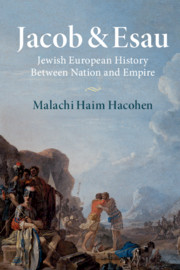Book contents
- Jacob & Esau
- Jacob & Esau
- Copyright page
- Dedication
- Contents
- Figures
- Acknowledgments
- A Note on Transliteration from Hebrew to English
- Introduction: Jewish European History
- 1 Writing Jewish European History
- 2 Rabbinic Jacob & Esau, Pagan Rome, and the Christian Empire
- 3 Esau, Ishmael, and Christian Europe: Medieval Edom
- 4 Waning Edom? Early Modern Christian–Jewish Hybridities
- 5 Jacob & Esau and Jewish Emancipation, I: 1789–1839
- 6 Jacob & Esau and Jewish Emancipation, II: 1840–1878
- 7 The Austrian Jewish Intelligentsia Between Nation and Empire, 1879–1918
- 8 Imperial Peoples in an Ethno-national Age? Jews and Other Austrians in the First Republic, 1918–1938
- 9 Jacob the Jew: Antisemitism and the End of Emancipation, 1879–1935
- 10 Esau the Goy: Jewish and German Ethnic Myths, 1891–1945
- 11 Typology and the Holocaust: Erich Auerbach and Judeo-Christian Europe
- 12 Postwar Europe: Austria, the Jewish Remigrés, and the Internationalization of Culture
- 13 A Post-Holocaust Breakthrough? Jacob & Esau Today
- Epilogue: The End of Postwar Exceptionalism
- Bibliography
- Index
11 - Typology and the Holocaust: Erich Auerbach and Judeo-Christian Europe
Published online by Cambridge University Press: 11 January 2019
- Jacob & Esau
- Jacob & Esau
- Copyright page
- Dedication
- Contents
- Figures
- Acknowledgments
- A Note on Transliteration from Hebrew to English
- Introduction: Jewish European History
- 1 Writing Jewish European History
- 2 Rabbinic Jacob & Esau, Pagan Rome, and the Christian Empire
- 3 Esau, Ishmael, and Christian Europe: Medieval Edom
- 4 Waning Edom? Early Modern Christian–Jewish Hybridities
- 5 Jacob & Esau and Jewish Emancipation, I: 1789–1839
- 6 Jacob & Esau and Jewish Emancipation, II: 1840–1878
- 7 The Austrian Jewish Intelligentsia Between Nation and Empire, 1879–1918
- 8 Imperial Peoples in an Ethno-national Age? Jews and Other Austrians in the First Republic, 1918–1938
- 9 Jacob the Jew: Antisemitism and the End of Emancipation, 1879–1935
- 10 Esau the Goy: Jewish and German Ethnic Myths, 1891–1945
- 11 Typology and the Holocaust: Erich Auerbach and Judeo-Christian Europe
- 12 Postwar Europe: Austria, the Jewish Remigrés, and the Internationalization of Culture
- 13 A Post-Holocaust Breakthrough? Jacob & Esau Today
- Epilogue: The End of Postwar Exceptionalism
- Bibliography
- Index
Summary
- Type
- Chapter
- Information
- Jacob & EsauJewish European History Between Nation and Empire, pp. 483 - 539Publisher: Cambridge University PressPrint publication year: 2019



